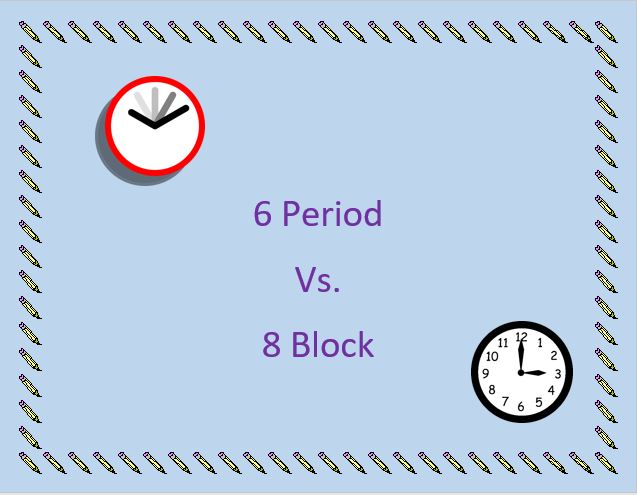Schedule Change
March 22, 2019
The schedule at Seward High School went through a big change the school year of 2016-2017. The schedule changed to a modified 8 period block schedule. It now allows students to earn 34 plus credits when only 22 are required for graduation. The controversy with the modified block schedule is more students are sitting in the halls, senior, juniors, and even many sophomores are earning so many credits that they don’t need to be in school as often. The option of switching to a straight 6 schedule is on the table, but before the decision is made the student body, as well as the staff and teachers, all deserve to have a say. Here is what they had to say.
I asked three students from each grade, three teachers from different subjects, and Mr.Walker a series of questions. The freshmen and sophomores had the same questions. Juniors had their own set, and seniors had a very different set because they will not be affected by schedule changes; and they are the only students who were on the six period schedule. The teachers were asked questions mainly directed to what they think are disadvantages and advantages of both schedules and what classes need the block. The interview with Mr. Walker was mainly to gain information on the entire situation and to give the student body knowledge of what Mr. Walker is doing and to help them understand that this is not a quick decision; a lot of thought is going into this issue. Let’s begin with the freshmen, work our way to seniors, then to the teachers, and close with the interview with Mr.Walker.
When the three freshmen were asked how they felt about the block schedule, all were mostly in favor of it. They like the extra time to work on homework, and not having the same classes everyday. They like having the longer periods for classes that can use the time to go deeper into the subject, or have more time for more access to help. Such as in, math, science, language arts, and foreign language. When these freshman were asked if they would like to graduate early, two out of three said yes. One had a plan to graduate a semester early, and one didn’t have a plan figured out but knew she wanted to graduate early. With the block schedule it makes it easier for students to earn the required credits to make this happen. One concern proposed was, due to juniors and seniors not having classes, meaning they aren’t at school as often, leaves underclassmen without role models. From this hypothesis, I asked underclassmen the question that if they had a teacher and an upperclassmen friend tell them to stop doing something, which of the two would they listen to. They agreed “a teacher because they could actually do something to you.”
Next up, sophomores. Sophomores had the same set of questions as freshmen, because they are both underclassmen and both are required to have a PLC with a few exceptions. Those exceptions being that sophomore has a vehicle, a license, and/or a job. They all like the block schedule, with it’s low-stress environment and longer classes because it allows more work time and homework. What student doesn’t love less homework? Two of the sophomores interviewed said they wanted to graduate a full year early. One sophomore only needs 4 more credits to do so. Depending on whom you ask, the modified block schedule is beneficial to that, or it is harmful. When these sophomores were asked the question about whether they would listen to an upperclassmen or a teacher, all three said teacher because a teacher is an actual authority figure and probably has the facts, whereas, an upperclassman is just another student.
The set of questions changed for the juniors. Overall, the juniors I asked like the block schedule. One said that it could be better. All of the students like the benefits of the longer class periods, and it allowing for more time in class for help. All three plan to stay through their senior year, whether that’s just because they don’t know what to do, or because they can take college classes for a reduced price. Math, science, and language arts classes seem to be the classes that students, across the board, believe benefit from the block schedule. They think the longer class periods allow more time to help develop a better understanding of the topic being taught. Having the classes every other day also allow more time for access to help. These juniors enjoy the block schedule and support it.
Even though a schedule change won’t affect the senior class, they are the only students who have had a different schedule besides the modified block. Two out of three seniors like the modified block schedule, but they all had issues with Fridays. I got feedback on their opinion to the 6-period schedule versus the modified block. Some pro opinions towards the 6 period include, the advisory period was nice because you were able to go talk to teachers without interrupting a class, and you knew which classes you had that day because it was the same everyday. Some pros about the modified block were, you can gain more credits, seniors don’t necessarily need to be here all day every day, and the longer class periods are beneficial. Some cons to the 6 period were the shorter classes meant you couldn’t go as deep into a subject, and sometimes it was harder to get all the help needed in class. Some cons to the modified block are Fridays, and the alternating classes can sometimes be difficult to follow. The seniors prefer the modified block because it’s beneficial for them, or because it’s just what they are used too.
Now the teachers. Most of the teachers have had a wide range of schedules they have taught, and they will teach the schedule they are given. Mr. Marshall says that with the block schedule he only needs to see his upperclassmen a couple times a week, but when it comes to his underclassmen he needs to see them almost daily. With the modified block schedule, class size varies from 25 in one class to 11 or less in another. The 6 period schedule is a tighter schedule and keeps students more on track. I had one teacher speak in favor of a four day school week because no matter what schedule we use, a majority of the students will be gone on Fridays due to sports and other extracurricular activities.
Mr. Walker had a lot to say. He made it very clear that he is all about student empowerment: “I want to empower our natural leaders to be leaders.” Seward High is a non-traditional high school. He is proud of our school and the students that are enrolled; his reasons being, traditional schools are founded on beliefs from Industrial Revolution. The industrial Revolution happened in the 18th century, time and students have changed dramatically since then. Seward High has changed and evolved with the evolution of the students. “Philosophically, our program tries to be student-centered based on students’ post-secondary educational goals.” The proof to this is, that since 2013, Seward High’s graduation rate has not dropped below 90.2%, and the second reason, Mr. Walker is only aware of 10 high school age students in Seward who are home-schooled: less than 10% of total enrollment at the high school. PLC’s were created because most sophomores can’t drive, were as juniors and seniors have the option to get out in the community. A conversation Mr. Walker has with a freshman will be completely different from his conversation with a senior.
For the schedule to change, Mr. Walker would need to engage and consult the students, staff, and the Seward Area Site Council. He wants the student input. When the schedule changed from the 6 period to the modified 8 period block, nobody wanted it to change. If we do change the schedule again, why not explore some more options? Taking into consideration there is certain amount of seat time a student is required to have. Seat time is an amount of time, set by the state, that a student has sat in a classroom. Schools were originally created to teach students how to be factory workers. Let’s take a look at a 4-day school week, where each day is 30 minutes longer. Or a modified 6 or 7 period schedule. There are more options than just a 6 period or a modified 8 block.
The student body has a voice; we deserve to have an input. Let’s help Mr. Walker help us. We might not want it to change, but why not explore more options while having an open mind and a cool head.






Student • Apr 2, 2019 at 4:13 pm
As a junior, I have only experienced the 8-block schedule in high school, and I prefer it over the non-block schedule used when I was in middle school. Although I like having more time to complete homework, and the longer classes to dive deeper into subjects, my favorite part is the variety of classes it enables our teachers to teach. Of course the teachers have to teach the core classes, but with the block schedule students have the option to learn subjects like Journalism, Shakespeare, Computer Apps, Engineering and smaller class sizes is really awesome. We have ~8 teachers at the highschool and they each teach PLC for one of the blocks, and then an extra class that wouldn’t be possible in the traditional 6 schedule. I don’t support shortening the school week because it would reduce the amount of time to for students to connect with and learn from teachers (4*.5=2 hours not the 7 hours a Friday provides.) Plus, it’s kinda nice to have a mostly empty school sometimes.